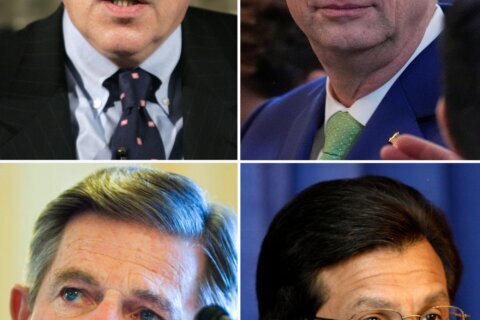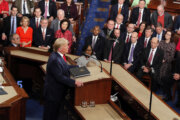WASHINGTON — It’s easy to imagine what side Michael Hayden, a former director of the Central Intelligence Agency and the National Security Agency, would take in the dispute between Apple and the FBI over hacking into the iPhone of one of the San Bernardino shooters. But it’s not that simple.
The FBI has demanded that Apple write code to get around the automatic security feature on an iPhone by which it locks up permanently after 10 unsuccessful attempts to guess the 4-digit access code. It’s been popularly portrayed as a conflict between privacy and security, but Hayden says that’s a false choice.
In the particular case in question, Hayden tells WTOP that the fact that the FBI is going through the courts makes a difference. He says the burden of proof is on Apple to prove “why giving in on this specific activity for one phone, under a court order, inevitably leads to this permanent, universal ability to get into their product.”
But any move toward that permanent access, Hayden says, is a bad idea, and not just from a privacy standpoint. Such matters are often considered a conflict between privacy and security, but Hayden, the author of the new book “Playing to the Edge: American Intelligence in the Age of Terror,” says that’s a false choice.
“There’s a powerful privacy argument off to the side,” Hayden, told WTOP recently, “but just in the security lane, right now I’m believing that American is better served — for its security — with unbreakable, end-to-end encryption. …
“And the government’s current request to have some kind of permanent, standing, baked-in access that they can call on — I actually think that that threatens that security.”
Once a way into a system is created, Hayden says, there’s no way to ensure that it’s only going to be used by the proper authorities: “When somebody puts a door into a system, he’s just upped my chances that someone can break in.”
WHILE FBI DIRECTOR JAMES COMEY is arguing that what he’s asking Apple to do is a one-off request for an important case, Hayden says, “you’ve got the U.S. attorney in Manhattan saying, ‘And as soon as you guys are done in California, I got a room full of these things here you should work on.’”
Hayden recalls that James Clapper, the director of national intelligence, recently told Congress that the No. 1 threat to the nation is not flesh-and-blood terrorism but cybersecurity.
“So in one sense, what you’ve got here is a proposal to unarguably weaken, across the board, our cyber defenses, in order to deal with this other particular threat. Like I said, it’s all trade-offs.”
And while there are no easy choices, he added, “I think unbreakable encryption, on balance, keeps more Americans more safe more of the time.”
In the end, he says, there are no easy choices.
WTOP’s Mike Moss remarked to Hayden that it doesn’t seem like it should be beyond the capabilities of the FBI to hack into an iPhone. But Hayden says you’d be surprised: “We are struggling to keep pace with the march of technology outside of our fence line.
“So it is not at all surprising that big companies like Apple and Google and Microsoft are making technological advances that are incredibly difficult for the government to keep up with, even if they wanted to.”
HAYDEN WENT ON to discuss the effort to combat the Islamic State — efforts he called “under-resourced and over-regulated. Not enough [is] committed, and that which is committed has been pulled back for a variety of reasons.”
He added, “Frankly, I think we need to freely admit that a lot of this is about Islam.
“It’s not about all of Islam, and it’s certainly not about all Muslims. But there is a great civil war going on in one of the world’s great monotheisms, and our denying that fact doesn’t help us think through an appropriate course of action.”
Later, he clarified by saying that his opinion isn’t a call for a religious-based war, but a recognition of the limits of what Westerners can do in the situation. While “kinetic military” operations can be successful in what he calls “the close fight,” when it comes to “the deep fight” of ideology, “our tools are limited.”
Unlike the Cold War conflict against communism, a Western philosophy “written by a German in a library in London,” in the long-term struggle within Islam, Hayden says, “We don’t have an authoritative voice.”
“I’m not trying to be politically correct,” he added; “I’m trying to be genuinely respectful. We need to have a deeper appreciation for not the conflict but the story.”
But in the end, he said on WTOP, “I get it; this is hard. I’m glad I’m not in the Situation Room anymore.”







